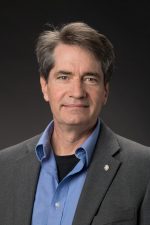The next decade at the Department of Energy’s Fermilab will witness major advancements on a number of projects: the start of data-taking at a large international neutrino experiment. The upgrade of Fermilab’s accelerator complex. The development of vital components for upgrades at CERN’s Large Hadron Collider. The construction of an engineering and research building on the Fermilab site to support the flagship neutrino program.
Supporting and enabling these and other projects is scientist and Chief Project Officer Bob Tschirhart, who began his term as Fermilab CPO on March 1.
“I’m excited to serve in this role, especially for the chance to work with new groups of people,” Tschirhart said. “In my career I’ve worked with scientists, engineers, technologists, computing professionals and management. In this position, I’m going to work more closely with DOE and project control professionals. That’s new for me.”
Prior to being CPO, Tschirhart was the deputy head of the Fermilab Computing Division and Particle Physics Division. A scientist at Fermilab since 1988, Tschirhart is a fellow of the American Physical Society. He also served on the High-Energy Physics Advisory Panel and the DOE Particle Physics Project Prioritization Panel, which in 2014 established the roadmap for the field of particle physics in the United States.
As CPO, Tschirhart will oversee Fermilab project costs, schedules and risks, maintaining transparency and open communication between Fermilab and the DOE Office of High Energy Physics.
“Our job is to provide review and project support services that enable scientific teams to clearly define science requirements, how these drive technology requirements and choices, and how those choices ultimately determine project definitions,” Tschirhart said. “Through that entire chain, we can track progress and change in a way that can be seen and understood by everybody.”
This is perhaps most crucial for the construction of Fermilab’s flagship, the international Deep Underground Neutrino Experiment, or DUNE, and its supporting infrastructure, the Long-Baseline Neutrino Facility.
DUNE, expected to start taking data in the 2020s, will be the largest international science experiment ever conducted on U.S. soil. It calls for a beam of neutrinos — little-understood subatomic particles — of unprecedented intensity. And to meet this need, Fermilab is revamping its accelerator complex to deliver high-power, high-energy neutrino beams to DUNE through another project, called the Proton Improvement Plan-II.
Other key projects in the Fermilab portfolio are the accelerator upgrade for the Large Hadron Collider at CERN; U.S. engagement in the associated CMS experiment; and the construction of a new Integrated Engineering and Research Center building at Fermilab, which will support Fermilab’s flagship neutrino program.
Fermilab Director Nigel Lockyer says that Tschirhart’s combination of scientific leadership and research experience makes him well-suited to the position. Tschirhart has served in numerous leadership roles in particle physics experiments, particle accelerator developments and particle detector projects both at Fermilab and as part of larger collaborations.
“One of the key traits of a capable CPO is the ability to translate science requirements into a technical solution, one we can build. Bob is one of the rare individuals who has that combination of skills,” Lockyer said. “He knows which solutions strike the right balance between science and technology. I’m very happy he’ll be managing our project portfolio during this crucial time in the laboratory’s growth.”
Tschirhart looks forward to working with a new team, headed by Rich Marcum, who will play a central role in tracking project progress.
He also acknowledges his predecessor, scientist Mike Lindgren, for his precedent-setting work as Fermilab’s first CPO. Lindgren was appointed the new head of the Fermilab Accelerator Division on March 1.
“Mike has set the standard for excellent communication between project managers, the laboratory and Department of Energy,” Tschirhart said. “He’s improved it dramatically and deserves enormous credit for that.”
Tschirhart aims to uphold the standard.
“The whole strategy for the future is based on the success of the projects, and the entire lab works together to see them through,” Tschirhart said. “I’m just one person that’s contributing to the projects’ success.”




